|
|
|
Sort Order |
|
|
|
Items / Page
|
|
|
|
|
|
|
| Srl | Item |
| 1 |
ID:
018749
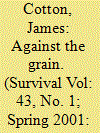

|
|
|
|
|
| Publication |
2001.
|
| Description |
p127-142
|
|
|
|
|
|
|
|
|
|
|
|
|
|
|
|
| 2 |
ID:
084983
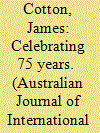

|
|
|
| 3 |
ID:
119069
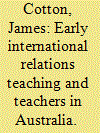

|
|
|
|
|
| Publication |
2013.
|
| Summary/Abstract |
Drawing on the insights of the current literature concerned with the institutions which fostered and supported the emergence of the international relations (IR) discipline, this article reassesses the Australian contribution in the interwar years. From this period, teaching materials and surviving lecture notes, as well as documentation of Australian participation in the International Studies Conference, show that, contrary to the received view, academies and institutions supported a recognisable IR, albeit in its formative stages. Even by the early 1920s there was a developing awareness that 'international relations' was a discrete subject worthy of presentation in a specific curriculum. The Melbourne school initiated by William Harrison Moore exerted the greatest influence; an energetic pioneering effort in Sydney under H. Duncan Hall was not maintained after his departure. Law and history departments offered such courses, though their place in wider programs depended upon the contingencies of personalities and appointments. By the 1930s, IR teachers were familiar with the major methodological debates of the era in the UK and the USA. While consistent attention was devoted to international organisation, and 'collective security' had its champions, the predominant view, in the terminology of the 'first debate', was neither idealist nor realist.
|
|
|
|
|
|
|
|
|
|
|
|
|
|
|
|
| 4 |
ID:
146525
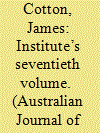

|
|
|
|
|
| Summary/Abstract |
Australian Outlook, published initially in 1947, was Australia’s first journal devoted exclusively to the analysis of Australia’s foreign relations and of international affairs. It emerged from a context where nationalist and internationalist sentiments were taking on new prominence and in a time of heightened public awareness of global issues. The journal came to provide a unique venue for academic and expert commentary, especially on the international politics of Australia’s region, as well as on a wide range of topics from defence and trade to great-power dynamics. Early contributions demonstrated a generally sound—and sometimes remarkably prescient—grasp of regional and international trends. The journal built on earlier Australian Institute of International Affairs publications—notably, the Austral-Asiatic Bulletin, inaugurated in 1937.
|
|
|
|
|
|
|
|
|
|
|
|
|
|
|
|
| 5 |
ID:
080145
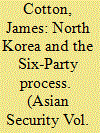

|
|
|
|
|
| Publication |
2007.
|
| Summary/Abstract |
This paper traces the development of the Six-Party process through to the joint statement by the parties on September 19, 2005, considers the subsequent decision by North Korea to stage a nuclear test in the context of the apparent stasis of the process, and then reviews the international condemnation that was the result of those tests. North Korea's decision to return to the talks is then discussed in light of the policy issues that must be solved if the September 19 principles can be realized in practice.
|
|
|
|
|
|
|
|
|
|
|
|
|
|
|
|
| 6 |
ID:
019777
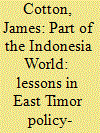

|
|
|
|
|
| Publication |
April 2001.
|
| Description |
119-131
|
|
|
|
|
|
|
|
|
|
|
|
|
|
|
|
| 7 |
ID:
064494
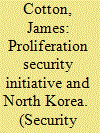

|
|
|
| 8 |
ID:
091022
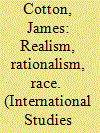

|
|
|
|
|
| Publication |
2009.
|
| Summary/Abstract |
The received view of the development of the international relations discipline in Australia discounts its early history, maintaining that it only came into existence in the 1960s. It was then confined, according to this account, within a realist-rationalist discourse. This article shows that if realism-rationalism is the identifying feature of the discipline in Australia, then many exemplars can be found in the earlier period from the 1920s to the Pacific War. Problems regarding empire, obligations towards the League of Nations, and Australia's position in the Pacific region were major concerns. Arguments in support of the League, or for an emerging Pacific order, were often couched in rationalist terms; with the increasing international uncertainty of the 1930s, realist arguments became more prominent. There are also some examples of revolutionist theory. However, a major preoccupation across the spectrum of international thinkers was the issue of race and the exclusionary White Australia immigration policy. It is argued that this theme cannot be readily assimilated to realism-rationalism.
|
|
|
|
|
|
|
|
|
|
|
|
|
|
|
|
| 9 |
ID:
110245
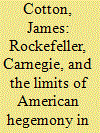

|
|
|
|
|
| Publication |
2012.
|
| Summary/Abstract |
This essay contributes to the emerging debate on the origins of international studies, focusing on evidence regarding Australia. While neither Carnegie nor Rockefeller had a primary interest in international studies, the largest US foundations had a major impact on the emergence of the subject in Australia ca. 1920-60. This impact was direct, through the provision of funding to individuals (via fellowships) as well as to organizations; it was also indirect by virtue of the support given to the Institute of Pacific Relations (a proportion of which was actually for specific Australian purposes). How this impact is to be characterized turns in part on methodological questions; it cannot however be seen as a clear case of the imposition of Gramscian-style hegemony in the realm of ideas. The most apparent influence of the foundations was to direct the attention of a selected body of Australian intellectuals, of sometimes diverse views, beyond Empire to transnational concerns.
|
|
|
|
|
|
|
|
|
|
|
|
|
|
|
|
| 10 |
ID:
165590
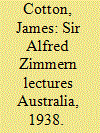

|
|
|
|
|
| Summary/Abstract |
Professor Sir Alfred Zimmern, a highly prominent British commentator on international politics, was a notable visitor to Australia in 1938. Due to the critiques of EH Carr, Martin Wight and Hedley Bull, Zimmern became associated with the ‘utopian’ school of analysis of the inter-war period. In a stay lasting five weeks which coincided with the Munich crisis, his (now neglected) lectures and broadcasts were widely reported. Zimmern did not fully endorse the Munich agreement, which had been negotiated by British Prime Minister Neville Chamberlain and was supported by Australian Prime Minister Joseph Lyons. He was privately critical of Australian policy-makers. Despite Bull’s claim that Zimmern was a believer in progress and thus bound to discern the growth of order in international affairs, Zimmern’s analysis of the Munich agreement emphasized the return of power politics and the dangers of war. Further examination of his 1930s writings shows that such possibilities were not inconsistent with his broader analysis of international relations.
|
|
|
|
|
|
|
|
|
|
|
|
|
|
|
|
| 11 |
ID:
057375
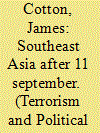

|
|
|
| 12 |
ID:
079855
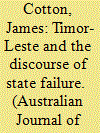

|
|
|
|
|
| Publication |
2007.
|
| Summary/Abstract |
The disorder in Timor-Leste in 2006, the collapse of the Alkatiri government, and the political crisis following the 2007 parliamentary elections have all fuelled speculation that the country is a potential 'failing state'. After outlining the history of the latter concept, this paper examines the Timor-Leste case in relation to the phenomena associated with social and political instability. It has exhibited tensions between the civil regime and the military, apparently deepening ethnic/regional differences, weakness in governance institutions and a dependence upon state office as a means to wealth/power; all of these factors are associated with instability. In addition, some policy choices have fostered particular grievances. Timor-Leste's situation with reference specifically to the comparative literatures on 'state failure' and on 'Africanisation' is then reviewed. State failure literature suggests that regime type and executive recruitment and participation practices are crucial; as a new democracy hitherto dominated by a distinct political faction and facing vital electoral contests, the political system was bound to exhibit turbulence. However, Timor-Leste should be seen in a broader comparative context; accordingly though clearly at risk some caveats should be entered on the prospects for 'failure' of the Timor-Leste state. Timor Leste never having been the site of a fully functioning state, its politics more resemble Melanesia than Africa
|
|
|
|
|
|
|
|
|
|
|
|
|
|
|
|
| 13 |
ID:
065106
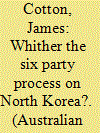

|
|
|
|
|
|
|
|